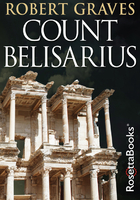With these measures fixed between us, they went off towards the shore, William in the pinnace with twelve men, and the long-boat coming after him with four-and-twenty more, all stout resolute fellows, and very well armed. They rowed so near the shore as that they might speak to one another, carrying a white flag, as the other did, and offering a parley. The brutes, for such they were, showed themselves very courteous; but finding we could not understand them, they fetched an old Dutchman, who had been their prisoner many years, and set him to speak to us. The sum and substance of his speech was, that the king of the country had sent his general down to know who we were, and what our business was. William stood up in the stern of the pinnace, and told him, that as to that, he, that was an European, by his language and voice, might easily know what we were, and our condition; the ship being aground upon the sand would also tell him that our business there was that of a ship in distress; so William desired to know what they came down for with such a multitude, and with arms and weapons, as if they came to war with us.
He answered, they might have good reason to come down to the shore, the country being alarmed with the appearance of ships of strangers upon the coast; and as our vessels were full of men, and as we had guns and weapons, the king had sent part of his military men, that, in case of any invasion upon the country, they might be ready to defend themselves, whatsoever might be the occasion.
"But," says he, "as you are men in distress, the king has ordered his general, who is here also, to give you all the assistance he can, and to invite you on shore, and receive you with all possible courtesy." Says William, very quick upon him, "Before I give thee an answer to that, I desire thee to tell me what thou art, for by thy speech thou art an European." He answered presently, he was a Dutchman. "That I know well," says William, "by thy speech; but art thou a native Dutchman of Holland, or a native of this country, that has learned Dutch by conversing among the Hollanders, who we know are settled upon this island?"
"No," says the old man, "I am a native of Delft, in the province of
Holland, in Europe."
"Well," says William, immediately, "but art thou a Christian or a heathen, or what we call a renegado?"
"I am," says he, "a Christian." And so they went on, in a short dialogue, as follows:-
William. Thou art a Dutchman, and a Christian, thou sayest; pray, art thou a freeman or a servant?
Dutchman. I am a servant to the king here, and in his army.
W. But art thou a volunteer, or a prisoner?
D. Indeed I was a prisoner at first, but am at liberty now, and so am a volunteer.
W. That is to say, being first a prisoner, thou hast liberty to serve them; but art thou so at liberty that thou mayest go away, if thou pleasest, to thine own countrymen?
D. No, I do not say so; my countrymen live a great way off, on the north and east parts of the island, and there is no going to them without the king's express license.
W. Well, and why dost thou not get a license to go away?
D. I have never asked for it.
W. And, I suppose, if thou didst, thou knowest thou couldst not obtain it.
D. I cannot say much as to that; but why do you ask me all these questions?
W. Why, my reason is good; if thou art a Christian and a prisoner, how canst thou consent to be made an instrument to these barbarians, to betray us into their hands, who are thy countrymen and fellow-Christians? Is it not a barbarous thing in thee to do so?
D. How do I go about to betray you? Do I not give you an account how the king invites you to come on shore, and has ordered you to be treated courteously and assisted?
W. As thou art a Christian, though I doubt it much, dost thou believe the king or the general, as thou callest it, means one word of what he says?
D. He promises you by the mouth of his great general.
W. I don't ask thee what he promises, or by whom; but I ask thee this: Canst thou say that thou believest he intends to perform it?
D. How can I answer that? How can I tell what he intends?
W. Thou canst tell what thou believest.
D. I cannot say but he will perform it; I believe he may.
W. Thou art but a double-tongued Christian, I doubt. Come, I'll ask thee another question: Wilt thou say that thou believest it, and that thou wouldst advise me to believe it, and put our lives into their hands upon these promises?
D. I am not to be your adviser.
W. Thou art perhaps afraid to speak thy mind, because thou art in their power. Pray, do any of them understand what thou and I say? Can they speak Dutch?
D. No, not one of them; I have no apprehensions upon that account at all.
W. Why, then, answer me plainly, if thou art a Christian: Is it safe for us to venture upon their words, to put ourselves into their hands, and come on shore?
D. You put it very home to me. Pray let me ask you another question: Are you in any likelihood of getting your ship off, if you refuse it?
W. Yes, yes, we shall get off the ship; now the storm is over we don't fear it.
D. Then I cannot say it is best for you to trust them.
W. Well, it is honestly said.
D. But what shall I say to them?
W. Give them good words, as they give us.
D. What good words?
W. Why, let them tell the king that we are strangers, who were driven on his coast by a great storm; that we thank him very kindly for his offer of civility to us, which, if we are further distressed, we will accept thankfully; but that at present we have no occasion to come on shore; and besides, that we cannot safely leave the ship in the present condition she is in; but that we are obliged to take care of her, in order to get her off; and expect, in a tide or two more, to get her quite clear, and at an anchor.
D. But he will expect you to come on shore, then, to visit him, and make him some present for his civility.
W. When we have got our ship clear, and stopped the leaks, we will pay our respects to him.
D. Nay, you may as well come to him now as then.
W. Nay, hold, friend; I did not say we would come to him then: you talked of making him a present, that is to pay our respects to him, is it not?
D. Well, but I will tell him that you will come on shore to him when your ship is got off.
W. I have nothing to say to that; you may tell him what you think fit.
D. But he will be in a great rage if I do not.
W. Who will he be in a great rage at?
D. At you.
W. What occasion have we to value that?
D. Why, he will send all his army down against you.
W. And what if they were all here just now? What dost thou suppose they could do to us?
D. He would expect they should burn your ships and bring you all to him.
W. Tell him, if he should try, he may catch a Tartar.
D. He has a world of men.
W. Has he any ships?
D. No, he has no ships.
W. Nor boats?
D. No, nor boats.
W. Why, what then do you think we care for his men? What canst thou do now to us, if thou hadst a hundred thousand with thee?
D. Oh! they might set you on fire.
W. Set us a-firing, thou meanest; that they might indeed; but set us on fire they shall not; they may try, at their peril, and we shall make mad work with your hundred thousand men, if they come within reach of our guns, I assure thee.
D. But what if the king gives you hostages for your safety?
W. Whom can he give but mere slaves and servants like thyself, whose lives he no more values than we an English hound?
D. Whom do you demand for hostages?
W. Himself and your worship.
D. What would you do with him?
W. Do with him as he would do with us-cut his head off.
D. And what would you do with me?
W. Do with thee? We would carry thee home into thine own country; and, though thou deservest the gallows, we would make a man and a Christian of thee again, and not do by thee as thou wouldst have done by us-betray thee to a parcel of merciless, savage pagans, that know no God, nor how to show mercy to man.
D. You put a thought in my head that I will speak to you about to-morrow.
Thus they went away, and William came on board, and gave us a full account of his parley with the old Dutchman, which was very diverting, and to me instructing; for I had abundance of reason to acknowledge William had made a better judgment of things than I.
It was our good fortune to get our ship off that very night, and to bring her to an anchor at about a mile and a half farther out, and in deep water, to our great satisfaction; so that we had no need to fear the Dutchman's king, with his hundred thousand men; and indeed we had some sport with them the next day, when they came down, a vast prodigious multitude of them, very few less in number, in our imagination, than a hundred thousand, with some elephants; though, if it had been an army of elephants, they could have done us no harm; for we were fairly at our anchor now, and out of their reach. And indeed we thought ourselves more out of their reach than we really were; and it was ten thousand to one that we had not been fast aground again, for the wind blowing off shore, though it made the water smooth where we lay, yet it blew the ebb farther out than usual, and we could easily perceive the sand, which we touched upon before, lay in the shape of a half-moon, and surrounded us with two horns of it, so that we lay in the middle or centre of it, as in a round bay, safe just as we were, and in deep water, but present death, as it were, on the right hand and on the left, for the two horns or points of the sand reached out beyond where our ship lay near two miles.
On that part of the sand which lay on our east side, this misguided multitude extended themselves; and being, most of them, not above their knees, or most of them not above ankle-deep in the water, they as it were surrounded us on that side, and on the side of the mainland, and a little way on the other side of the sand, standing in a half-circle, or rather three-fifths of a circle, for about six miles in length. The other horn, or point of the sand, which lay on our west side, being not quite so shallow, they could not extend themselves upon it so far.
They little thought what service they had done us, and how unwittingly, and by the greatest ignorance, they had made themselves pilots to us, while we, having not sounded the place, might have been lost before we were aware. It is true we might have sounded our new harbour before we had ventured out, but I cannot say for certain whether we should or not; for I, for my part, had not the least suspicion of what our real case was; however, I say, perhaps, before we had weighed, we should have looked about us a little. I am sure we ought to have done it; for, besides these armies of human furies, we had a very leaky ship, and all our pumps could hardly keep the water from growing upon us, and our carpenters were overboard, working to find out and stop the wounds we had received, heeling her first on the one side, and then on the other; and it was very diverting to see how, when our men heeled the ship over to the side next the wild army that stood on the east horn of the sand, they were so amazed, between fright and joy, that it put them into a kind of confusion, calling to one another, hallooing and skreeking, in a manner that it is impossible to describe.
While we were doing this, for we were in a great hurry you may be sure, and all hands at work, as well at the stopping our leaks as repairing our rigging and sails, which had received a great deal of damage, and also in rigging a new main-top-mast and the like;-I say, while we were doing all this, we perceived a body of men, of near a thousand, move from that part of the army of the barbarians that lay at the bottom of the sandy bay, and came all along the water's edge, round the sand, till they stood just on our broadside east, and were within about half-a-mile of us. Then we saw the Dutchman come forward nearer to us, and all alone, with his white flag and all his motions, just as before, and there he stood.
Our men had but just brought the ship to rights again as they came up to our broadside, and we had very happily found out and stopped the worst and most dangerous leak that we had, to our very great satisfaction; so I ordered the boats to be hauled up and manned as they were the day before, and William to go as plenipotentiary. I would have gone myself if I had understood Dutch, but as I did not, it was to no purpose, for I should be able to know nothing of what was said but from him at second-hand, which might be done as well afterwards. All the instructions I pretended to give William was, if possible, to get the old Dutchman away, and, if he could, to make him come on board.
Well, William went just as before, and when he came within about sixty or seventy yards of the shore, he held up his white flag as the Dutchman did, and turning the boat's broadside to the shore, and his men lying upon their oars, the parley or dialogue began again thus:-
William. Well, friend, what dost thou say to us now?
Dutchman. I come of the same mild errand as I did yesterday.[1]
W. What! dost thou pretend to come of a mild errand with all these people at thy back, and all the foolish weapons of war they bring with them? Prithee, what dost thou mean?
D. The king hastens us to invite the captain and all his men to come on shore, and has ordered all his men to show them all the civility they can.
W. Well, and are all those men come to invite us ashore?
D. They will do you no hurt, if you will come on shore peaceably.
W. Well, and what dost thou think they can do to us, if we will not?
D. I would not have them do you any hurt then, neither.
W. But prithee, friend, do not make thyself fool and knave too. Dost not thou know that we are out of fear of all thy army, and out of danger of all that they can do? What makes thee act so simply as well as so knavishly?
D. Why, you may think yourselves safer than you are; you do not know what they may do to you. I can assure you they are able to do you a great deal of harm, and perhaps burn your ship.
W. Suppose that were true, as I am sure it is false; you see we have more ships to carry us off (pointing to the sloop).[2]
D. We do not value that; if you had ten ships, you dare not come on shore, with all the men you have, in a hostile way; we are too many for you.
W. Thou dost not, even in that, speak as thou meanest; and we may give thee a trial of our hands when our friends come up to us, for thou hearest they have discovered us.
[Just then the sloop fired five guns, which was to get news of us, for they did not see us.]
D. Yes, I hear they fire; but I hope your ship will not fire again; for, if they do, our general will take it for breaking the truce, and will make the army let fly a shower of arrows at you in the boat.
W. Thou mayest be sure the ship will fire that the other ship may hear them, but not with ball. If thy general knows no better, he may begin when he will; but thou mayest be sure we will return it to his cost.
D. What must I do, then?
W. Do! Why, go to him, and tell him of it beforehand, then; and let him know that the ship firing is not at him nor his men; and then come again, and tell us what he says.
D. No; I will send to him, which will do as well.
W. Do as thou wilt, but I believe thou hadst better go thyself; for if our men fire first, I suppose he will be in a great wrath, and it may be at thee; for, as to his wrath at us, we tell thee beforehand we value it not.
D. You slight them too much; you know not what they may do.
W. Thou makest as if these poor savage wretches could do mighty things: prithee, let us see what you can all do, we value it not; thou mayest set down thy flag of truce when thou pleasest, and begin.
D. I had rather make a truce, and have you all part friends.
W. Thou art a deceitful rogue thyself, for it is plain thou knowest these people would only persuade us on shore to entrap and surprise us; and yet thou that art a Christian, as thou callest thyself, would have us come on shore and put our lives into their hands who know nothing that belongs to compassion, good usage, or good manners. How canst thou be such a villain?
D. How can you call me so? What have I done to you, and what would you have me do?
W. Not act like a traitor, but like one that was once a Christian, and would have been so still, if you had not been a Dutchman.
D. I know not what to do, not I. I wish I were from them; they are a bloody people.
W. Prithee, make no difficulty of what thou shouldst do. Canst thou swim?
D. Yes, I can swim; but if I should attempt to swim off to you, I should have a thousand arrows and javelins sticking in me before I should get to your boat.
W. I'll bring the boat close to thee, and take thee on board in spite of them all. We will give them but one volley, and I'll engage they will all run away from thee.
D. You are mistaken in them, I assure you; they would immediately come all running down to the shore, and shoot fire-arrows at you, and set your boat and ship and all on fire about your ears.
W. We will venture that if thou wilt come off.
D. Will you use me honourably when I am among you?
W. I'll give thee my word for it, if thou provest honest.
D. Will you not make me a prisoner?
W. I will be thy surety, body for body, that thou shalt be a free man, and go whither thou wilt, though I own to thee thou dost not deserve it.
Just at this time our ship fired three guns to answer the sloop and let her know we saw her, who immediately, we perceived, understood it, and stood directly for the place. But it is impossible to express the confusion and filthy vile noise, the hurry and universal disorder, that was among that vast multitude of people upon our firing off three guns. They immediately all repaired to their arms, as I may call it; for to say they put themselves into order would be saying nothing.
Upon the word of command, then, they advanced all in a body to the seaside, and resolving to give us one volley of their fire-arms (for such they were), immediately they saluted us with a hundred thousand of their fire-arrows, every one carrying a little bag of cloth dipped in brimstone, or some such thing, which, flying through the air, had nothing to hinder it taking fire as it flew, and it generally did so.
I cannot say but this method of attacking us, by a way we had no notion of, might give us at first some little surprise, for the number was so great at first, that we were not altogether without apprehensions that they might unluckily set our ship on fire, so that William resolved immediately to row on board, and persuade us all to weigh and stand out to sea; but there was no time for it, for they immediately let fly a volley at the boat, and at the ship, from all parts of the vast crowd of people which stood near the shore. Nor did they fire, as I may call it, all at once, and so leave off; but their arrows being soon notched upon their bows, they kept continually shooting, so that the air was full of flame.
I could not say whether they set their cotton rag on fire before they shot the arrow, for I did not perceive they had fire with them, which, however, it seems they had. The arrow, besides the fire it carried with it, had a head, or a peg, as we call it, of bone; and some of sharp flint stone; and some few of a metal, too soft in itself for metal, but hard enough to cause it to enter, if it were a plank, so as to stick where it fell.
William and his men had notice sufficient to lie close behind their waste-boards, which, for this very purpose, they had made so high that they could easily sink themselves behind them, so as to defend themselves from anything that came point-blank (as we call it) or upon a line; but for what might fall perpendicularly out of the air they had no guard, but took the hazard of that. At first they made as if they would row away, but before they went they gave a volley of their fire-arms, firing at those which stood with the Dutchman; but William ordered them to be sure to take their aim at others, so as to miss him, and they did so.
There was no calling to them now, for the noise was so great among them that they could hear nobody, but our men boldly rowed in nearer to them, for they were at first driven a little off, and when they came nearer, they fired a second volley, which put the fellows into great confusion, and we could see from the ship that several of them were killed or wounded.
We thought this was a very unequal fight, and therefore we made a signal to our men to row away, that we might have a little of the sport as well as they; but the arrows flew so thick upon them, being so near the shore, that they could not sit to their oars, so they spread a little of their sail, thinking they might sail along the shore, and lie behind their waste-board; but the sail had not been spread six minutes till it had five hundred fire-arrows shot into it and through it, and at length set it fairly on fire; nor were our men quite out of the danger of its setting the boat on fire, and this made them paddle and shove the boat away as well as they could, as they lay, to get farther off.
By this time they had left us a fair mark at the whole savage army; and as we had sheered the ship as near to them as we could, we fired among the thickest of them six or seven times, five guns at a time, with shot, old iron, musket-bullets, &c.
We could easily see that we made havoc among them, and killed and wounded abundance of them, and that they were in a great surprise at it; but yet they never offered to stir, and all this while their fire-arrows flew as thick as before.
At last, on a sudden their arrows stopped, and the old Dutchman came running down to the water-side all alone, with his white flag, as before, waving it as high as he could, and making signals to our boat to come to him again.
William did not care at first to go near him, but the man continuing to make signals to him to come, at last William went; and the Dutchman told him that he had been with the general, who was much mollified by the slaughter of his men, and that now he could have anything of him.
"Anything!" says William; "what have we to do with him? Let him go about his business, and carry his men out of gunshot, can't he?"
"Why," says the Dutchman, "but he dares not stir, nor see the king's face; unless some of your men come on shore, he will certainly put him to death."
"Why, then," says William, "he is a dead man; for if it were to save his life, and the lives of all the crowd that is with him, he shall never have one of us in his power. But I'll tell thee," said William, "how thou shalt cheat him, and gain thy own liberty too, if thou hast any mind to see thy own country again, and art not turned savage, and grown fond of living all thy days among heathens and savages."
"I would be glad to do it with all my heart," says he; "but if I should offer to swim off to you now, though they are so far from me, they shoot so true that they would kill me before I got half-way."
"But," says William, "I'll tell thee how thou shalt come with his consent. Go to him, and tell him I have offered to carry you on board, to try if you could persuade the captain to come on shore, and that I would not hinder him if he was willing to venture."
The Dutchman seemed in a rapture at the very first word. "I'll do it," says he; "I am persuaded he will give me leave to come."
Away he runs, as if he had a glad message to carry, and tells the general that William had promised, if he would go on board the ship with him, he would persuade the captain to return with him. The general was fool enough to give him orders to go, and charged him not to come back without the captain; which he readily promised, and very honestly might.
So they took him in, and brought him on board, and he was as good as his word to them, for he never went back to them any more; and the sloop being come to the mouth of the inlet where we lay, we weighed and set sail; but, as we went out, being pretty near the shore, we fired three guns, as it were among them, but without any shot, for it was of no use to us to hurt any more of them. After we had fired, we gave them a cheer, as the seamen call it; that is to say, we hallooed, at them, by way of triumph, and so carried off their ambassador. How it fared with their general, we know nothing of that.
This passage, when I related it to a friend of mine, after my return from those rambles, agreed so well with his relation of what happened to one Mr Knox, an English captain, who some time ago was decoyed on shore by these people, that it could not but be very much to my satisfaction to think what mischief we had all escaped; and I think it cannot but be very profitable to record the other story (which is but short) with my own, to show whoever reads this what it was I avoided, and prevent their falling into the like, if they have to do with the perfidious people of Ceylon. The relation is as follows:-















